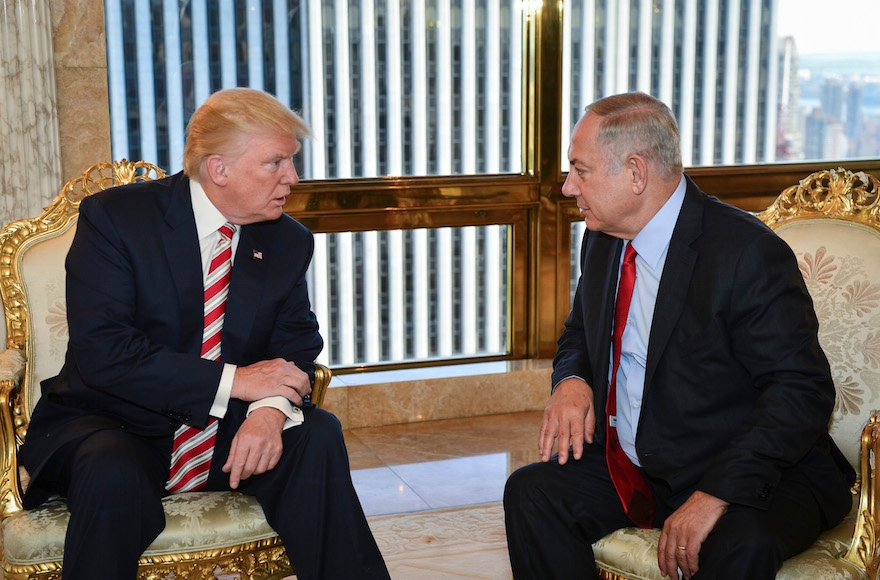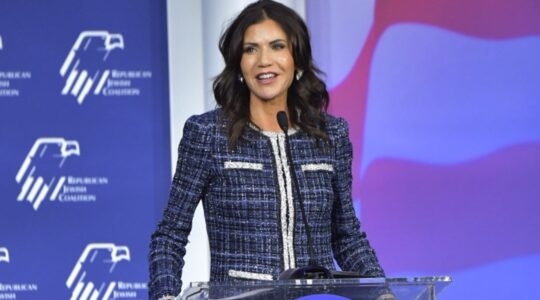WASHINGTON (JTA) – Benjamin Netanyahu is going to stride in through the White House front door. Donald Trump is not going to grimace while Netanyahu lectures.
The talk in Washington this week, at least in Israel-obsessive circles, is about how the Bibi-Donald bromance, taking center stage Feb. 15 at a White House summit, is going to be easy like a Sunday morning (even though it’s on a Wednesday).
Never mind that the story about the Israeli prime minister slipping in through the back door in 2010, when Barack Obama was president, was an urban legend. The two leaders definitely had their ups and downs – Obama’s grimace during Netanyahu’s Oval Office Middle East history lecture was real enough.
And now, it’s going to be all good. What did President Trump say last month on Fox News Channel about the U.S.-Israel relationship?
“It got repaired as soon as I took the oath of office” is what he said.
And what was it Netanyahu said on Inauguration Day?
“Congrats to my friend President Trump,” the prime minister said on Twitter. “Look fwd to working closely with you to make the alliance between Israel&USA stronger than ever.”
Certainly there is greater agreement between Netanyahu and Trump in areas that dogged the Obama-Netanyahu relationship. Both Trump and Netanyahu have said the Iran nuclear deal is a bad one, and Trump’s White House upended U.S. policy last week by saying settlements are not an impediment to peace.
But there are enough areas where agreement is tentative and vague – and enough history of leaders of both countries creating crises by stepping on each others’ vagueness – that plenty could go wrong.
So where are Netanyahu and Trump likely to agree and where could it go wrong? Here are four areas:
Iran
Where they agree: Trump and Netanyahu both think the 2015 deal exchanging sanctions relief for a nuclear rollback gave away too much to Iran. Trump has called it the worst deal he has ever seen — at least until last week, when he called the deal to absorb 1,200 or so refugees from Australia the worst.
Where they may not agree: Trump’s top officials – most prominently James Mattis, the defense secretary – also don’t like the deal, but say dismantling it now that it is in place would do more harm than good. The argument is that the sanctions relief – removing the main means of pressuring Iran — came at the outset of the deal, and that rebuilding the international sanctions regime now is all but impossible. Republicans in Congress, the last redoubt of plans to kill the deal, are shifting toward that point of view as well.
That also, reportedly, is the posture of the Israeli defense establishment – extract what good one can from the deal for the time being.
But Netanyahu has consistently spoken in terms of scrapping the deal, and said not long after Trump was elected that he would present those options to him when they meet.
“There are ways, various ways of undoing it,” Netanyahu said in an interview on “60 Minutes” in December. “I have about five things in my mind.”
Where they could compromise: After Iran tested a ballistic missile last week, Trump’s national security adviser, Michael Flynn, put Iran “on notice” and the Trump administration slapped new non-nuclear sanctions on Iran.
Novel? Not so much – the Obama administration smacked Iran with similar sanctions the last time it tested missiles, a year ago. But the tough talk and the threat of additional sanctions could provide a space for Netanyahu and Trump to appear, for now, on the same page.
After weeks of talking up the undoing of the deal Netanyahu, meeting with British Prime Minister Theresa May in London on Monday, seemed ready instead to emphasize new non-nuclear related sanctions.
“I welcome President Trump’s insistence on new sanctions against Iran,” he said, addressing May. “I think other nations should follow suit, certainly responsible nations, and I’d like to talk to you about how we can ensure Iran’s aggression does not go unanswered.”
Privately, in exchange for tamping down the kill-the-deal talk, Netanyahu might seek reassurances from Trump that Iran is considered the region’s worst actor, said Shoshana Bryen, the senior director of the conservative Jewish Policy Center.
“Netanyahu will want to know how much reassurance can [Trump] give Israel that he sees Iran as the locus of evil in the region,” she said.
Settlements
Where they agree: The Trump administration, releasing a statement last week on Israel’s announcement of new settlement building in the West Bank and eastern Jerusalem, said that while new settlement announcements “may not be helpful in achieving ” peace, they are also not an impediment to peace.
That upends decades of policy, through presidents Democratic and Republican, declaring settlements were indeed an impediment to peace. And it dovetails perfectly with Netanyahu’s overarching argument throughout the Obama presidency: The Palestinian refusal to re-engage in direct talks without preconditions is the main factor obstructing peace.
Where they may not agree: As much the Netanyahu government welcomed the reversal of decades of policy of settlements as an impediment to peace, the thrust of the White House statement was to caution Israel: “The construction of new settlements or the expansion of existing settlements beyond their current borders may not be helpful in achieving that goal.”
Translation: Don’t get ahead of yourselves. No more surprises.
Surprise! On Monday, the Knesset passed a bill that would retroactively legalize settlements on Palestinian-owned land. Sean Spicer, Trump’s spokesman, declined on Tuesday to comment on the measure, except to tell reporters at the daily briefing that “it will be a topic of discussion” when the leaders meet.
Trump is likely getting pushback on settlement expansion from Arab allies in the region like Jordan and Saudi Arabia, said Ilan Goldenberg, the director of the Middle East Security Program at the Center for a New American Security. Russia, too, whom Trump would like to cultivate as an ally, is likely relaying messages that Israeli settlement expansion could undermine efforts to rally other Arabs to help crush the Islamic State terrorist group.
“The expectation going in with Trump was that the Israelis would be free to do whatever they want,” said Goldenberg, who helped lead the State Department team in the last round of Israeli-Palestinian peace talks in Obama’s second term. “That could create some constraints against giving the Israelis carte blanche.”
Where they could compromise: Netanyahu, still committed to the two-state solution, is said not to be overly thrilled with the legislation. If there is one thing he misses about Obama, it’s using him as a foil to put the brakes on the ambitions of the settlement movement. Being able to say he was “forced” by Washington to limit settlement building could be just what Netanyahu wants.
Syria
Where they agree: Trump sees Syria as a theater to crush the Islamic State. Israel is all for crushing the Islamic State.
Where they may disagree: This could be the knottiest problem afflicting Trump-Netanyahu comity. Trump wants to work with Russia in crushing the Islamic State. Russia is formally allied with the Assad regime in Syria, which means it is informally allied with Israel’s deadliest enemy, Iran, and with Iran’s Lebanese proxy. The last thing Israel wants is Iran and Hezbollah looming over its northern border.
Where they could compromise: Netanyahu will likely make the case to Trump that any lasting deal in Syria’s southwest – bordering the Golan Heights – needs to keep Iran and Hezbollah far away. That could mean an arrangement in which moderate opposition forces, backed by the United States and Jordan, maintain control – although that would be a hard sell to the Russians, who have been pounding moderates.
The other compromise – and less to Israel’s liking – would be to have Assad forces, and only Assad forces, move into the region.
Israel once favored the Assads as the best of the worst: a dangerous enemy, but at least able to keep the northern border quiet. The civil war, and Bashar Assad becoming beholden to Iran and Hezbollah, have shattered that outlook. Now those three actors – Assad, Iran and Hezbollah – are inextricably intertwined in Israel’s view, said Daniel Shapiro, until last month the U.S. ambassador to Israel.
“Assad has talked about retaking all of Syria,” he said. “Anywhere that happens, you have to believe that Hezbollah and Iran gain some kind of strategic advantage.”
The Holocaust
Where they agree: Um.
Where they may disagree: Trump’s International Holocaust Remembrance Day statement omitted the salient fact that the victims of the Holocaust were Jewish. Netanyahu is all about protecting Jews. He told Tal Shalev, a journalist for Walla accompanying him to London, “I think that question will be addressed fully during the visit [to Washington] and will be answered fully.”
Where they may compromise: There’s no compromise on who the victims of the Holocaust were – and Trump’s team, if anything, is doubling down on its claim that the statement was appropriate and its critics misguided (or “pathetic” and “asinine,” as Trump aides variously said).
A way out, though, may be Netanyahu not lecturing Trump on history, as he did six years ago with Obama, but gently explaining why getting the history right is in the U.S. interest, said Bryen.
“If you say, ‘Donald you screwed it up,’ what have you accomplished?” she asked. “If you share some thoughts about how [omitting Jews from mentions of the Holocaust] impacts American Jews, how it impacts Israel – you have a reason for raising it.”
JTA has documented Jewish history in real-time for over a century. Keep our journalism strong by joining us in supporting independent, award-winning reporting.






